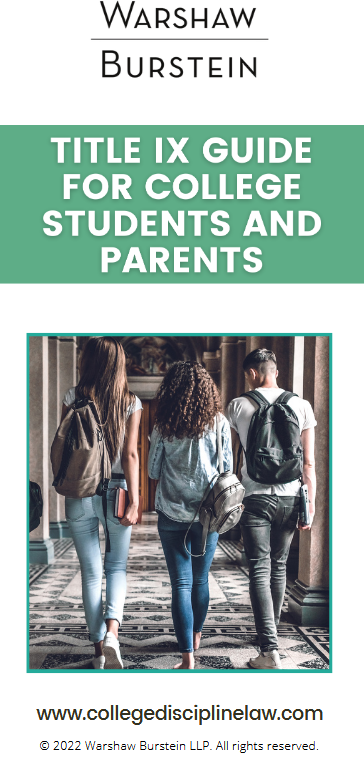-
Khan v. Yale Univ., 85 F.4th 86 (2d Cir. 2023)
12/07/2023
Applying Connecticut law, the Second Circuit held that Yale University’s disciplinary proceedings were not quasi-judicial and the Defendant was not entitled to absolute immunity for statements made during the disciplinary process.
-
Doe v. Purchase College State University of New York
05/25/2021
After being briefed and hearing oral arguments on the matter, the Appellate Division of the Supreme Court, Second Department determined that the State University of New York, Purchase College's ("SUNY Purchase") decision to suspend John Doe for a year was not supported by substantial evidence. The case was handled by Warshaw Burstein LLP's Title IX and College Discipline group, with Partner Kimberly Lau presenting the oral argument.
-
Sheppard v. Visitors of Virginia State University, Docket No. 19-2452, 2021 U.S. App. LEXIS 9670 (4th Cir. Apr. 2, 2021)
04/13/2021
The Fourth Circuit Court of Appeals becomes the fifth court of appeals to forgo doctrinal tests for Title IX, and instead merely asks "do the alleged facts, if true, raise a plausible inference that the university discriminated against the student on the basis of sex?" The Court answered this question in the negative and affirmed the dismissal of Plaintiff’s Title IX, and Equal Protection claims. The Court also found no protected property interest at stake, granting Defendant Debose qualified immunity from Plaintiff’s due process claims.
-
Doe v. Tex. A&M Univ., 2021 U.S. Dist. LEXIS 14114, No. H-20-4332 (S.D. Tex. Jan 26, 2021)
02/01/2021
John Doe’s motion for temporary restraining order and preliminary injunction was denied. Plaintiff is unlikely to succeed on the merits of his Title IX and due process claims. Plaintiff failed to cast articulable doubt on the accuracy of Texas A&M’s disciplinary proceeding. Doe also failed to show facts necessary to support an inference of bias. The Court also held that the delay in Doe’s education and any reputational damage he may suffer is compensable and/or speculative.
-
U.S. Department of Education Launches New Title IX Resources for Students and Institutions as Historic New Rule Takes Effect
10/5/20
On August 14, 2020, U.S. Secretary of Education Betsy DeVos launched new resources to help students and schools understand the protections provided by the Department of Education’s (DOE) historic regulation on Title IX.
The rule extends many new protections against sexual harassment, and strongly safeguards the rights of all students, including the right to due process. The DOE also launched a new web site that provides a one-stop resource for this key information, including how to file a complaint, an overview of the rule’s protections for survivors, and a detailed webinar on how schools can fully implement and uphold the new provisions in the law.
This blog post provides details on the new regulations.
-
Doe v. University of Connecticut, No. 3:20CV92 (MPS) (D. Conn. Jan. 23, 2020).
02/11/2020
Court granted TRO allowing John Doe to return to class pending litigation of his motion for a preliminary injunction. John Doe was able to show under the heightened standard for a mandatory injunction that he was entitled to a TRO.
-
Doe v. Arizona Board of Regents, NO.1 CA-CV 18-0784 (Ct. App. Dec. 24, 2019)
Unknown Party v. Arizona Board of Regents, No. CV-18-01623-PHX-DWL (D. Ariz. Dec. 27, 2019)
12/31/2019
John Doe’s administrative appeal was remanded to the Superior Court following the Arizona Court of Appeals’ finding that Arizona State University’s decision to expel John Doe was not supported by substantial evidence. In a simultaneous suit brought in the District of Arizona, Doe’s Title IX claim was allowed to proceed, while his due process and state law claims were dismissed.
-
Doe v. Haas, No. 19-CV-0014 (DRH)(AKT), 2019 U.S. Dist. LEXIS 211575 (E.D.N.Y. Dec. 9, 2019)
12/17/2019
John Doe was permitted to proceed with his Title IX erroneous outcome claim where the allegations in the complaint showed he was treated differently than his accuser during the adjudicative process. However, Doe’s due process and selective enforcement claims were dismissed.
-
Doe v. Trustees of Boston College, No. 19-1871 (1st Cir. Nov. 20, 2019)
11/26/2019
The First Circuit reversed and vacated the district court’s preliminary injunction because Massachusetts’ breach of contract law does not require a private university to provide respondents an opportunity to cross-examine their accusers in order to comport with “basic fairness.”
-
Harnois v. University of Massachusetts at Dartmouth, No. 19-10705-RGS (D.Mass. Oct. 28, 2019)
10/30/2019
Former graduate student brought suit against UMass Dartmouth for Title IX and due process violations stemming from a Title IX investigation that ultimately found insufficient evidence to hold him responsible. Student’s main claims survived UMass Dartmouth’s motion to dismiss.
-
Ukwuachu v. State, No. 10-15-00376-CR, 2019 Tex. App. LEXIS 5783 (July 10, 2019).
10/16/2019
Appellant’s due process rights were violated at trial where the State furnished false testimony to secure a guilty verdict. A prosecutor’s use of false testimony to obtain a conviction violates an individual’s due process rights under the Fourteenth Amendment. The court found that the State’s use of false testimony in both the cross-examination of a witness, and their closing argument was reasonably likely to affect the judgment of the jury. The court reversed Appellant’s conviction and remanded the matter for a new trial.
-
Doe v. Univ. of Miss, No. 3:18-CV-138-DPJ-FKB, 2019 U.S. Dist. LEXIS 7490 (S.D. Miss. Jan. 16, 2019)
01/16/2019
The University of Mississippi’s Motion to Dismiss was denied as to plaintiff, Andrew Doe’s Title IX and due process claims. Doe stated a viable claim for due process based on the biased nature of the training materials provided to the Judicial Council, materials that encouraged determinations in favor of the complainant, as well as an inability to cross-examine complainant. Doe’s Title IX claim was sustained due to a flawed investigation by the Title IX coordinator, who failed to collect the testimony of key witnesses, excluded exculpatory evidence, ignored clear notice of a biased panel member and was treated less favorable than his counterpart for engaging in the same conduct.
-
Doe v. Regents of the University of California, 28 Cal.App.5th 44 (2018)
10/09/2018
Credibility determinations require effective cross-examination. The Court of Appeal of the State of California Second Appellate District Division Six found that UCSB denied student due process by failing to provide the accused with access to critical evidence, and not allowing adequate opportunity to cross examine witnesses or present evidence in their own defense.
-
Doe v. The University of Southern Mississippi, Case 2:18-cv-0015-KS-MTP (S.D. Miss. Sep. 26, 2018)
09/26/2018
University of Southern Mississippi ordered to immediately reinstate John Doe as a student in good standing after showing a substantial likelihood the lack of a live hearing with no cross-examination violated due process.
-
Doe v. Baum 903 F.3d 575 (6th Cir. 2018)
09/07/2018
Due process requires a hearing and opportunity to cross-examine witnesses. Sixth Circuit holds that where the credibility of witnesses is in dispute and material to the outcome, due process requires a hearing and opportunity to cross-examine witnesses.


